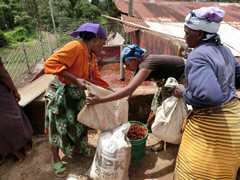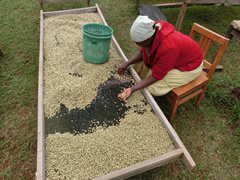- Home
- Technical Cooperation Projects
- Index of Countries
- Africa
- Tanzania
- Technical Cooperation in Strengthening the Backstopping Capacities for DADP Planning and Implementation under ASDP, Phase 2
- Project News
- Moshi Study Tour by Mbozi DC Farmers and District Officers
Project News
2013-12-01
Moshi Study Tour by Mbozi DC Farmers and District Officers
Our Project has been engaging in value chain promotion in the agricultural sector. In order to gain experience and good practices of the promotion, we have selected three pilot areas with specific commodities to focus. One of them is Mbozi District where coffee is their selected commodity. The district is one of the eleven Districts of Mbeya Region and locates at southern end of the central agricultural corridor of Tanzania[1].
In Tanzania, coffee has traditionally been grown in the Northern regions such as Kilimanjaro and Kagera. But in the last decade or so, the Southern areas began to expand production of coffee. Aspiring to be a major coffee producer in Tanzania, Mbozi picked up the crop as one of their focus commodity to promote.
Responding to the District's eagerness, the Project came to work together with the District office and farmer groups in the effort of improving their coffee value chain. The joint work is also supported by the Mbeya Regional office. As first action, the Project supported them to undertake a study tour to Moshi area which is the center of Tanzania coffee industry. There is "Moshi Coffee Auction", the headquarters of Tanzania Coffee Board and advanced farmer organizations. This study tour aims at exposing Mbozi District officers and farmers to advanced practice of coffee growing, processing and transactions.
[Major Purposes of the Study Tour]
- To learn the grading system and auction to understand how buyers assess coffee and what kind of coffee is demanded in the market.
- To learn how to improve coffee quality through better practices of agronomy and processing and how to control quality
- To learn good practices of farmers' groups in Moshi, such as group management and quality control
Schedule is given in the table below.
[Major Results]
- Participants (District officers and farmers) understood the way their product (i.e. coffee) is handled and sold to the international markets.
- Participants learned the importance of quality and how to improve it in production and processing.
- Participants observed that the same farmers (the farmer organizations at Kilimanjaro area) are doing better job than what they do now.
- Participants recognized the importance of farmer organization and operate it with transparency and accountability.
- Participants are motivated to inform and teach their home members about what they learned during the tour.
The Project connected the experience and motivations of participants to the next step of joint work such as training for better operation of their farmer organizations.
[Schedule]
| No. | Date | Visit/ Activity | Learning | |
|---|---|---|---|---|
| 1 | Nov 03 | Sun | Mbozi to Morogoro | |
| 2 | Nov 04 | Mon | Morogoro to Moshi | |
| 3 | Nov 05 | Tue | TaCRI (Tanzania Coffee Research Institure) |
1) Breeding (new varieties) 2) Agro forestry 3) Soil condition 4) Importance of post-harvest handling and processing 5) Integrated Pest Management |
| 4 | Nov 06 | Wed | TCB (Tanzania Coffee Board) KNCU(Kilimanjaro Native Co-operative Union) |
TCB 1) Marketing (Recent trends in the coffee market, important issues for producers such as buyers prefer trade of big volume rather than small volume) 2) Approaches for Value addition (Branding and Certificate) 3) Cupping and grading (coffee report and classification prepared by TCB) 4) How the results of classification(grading) are feed-backed to producers KNCU 1) How to run the union in an transparent and accountable way 2) Quality control 3) Activities to generate more profit (own brand, run the UNION cafe, etc.) |
| 5 | Nov 07 | Thu | Briefing about the auction Observe the auction Visit AMCOS (Agricultural Marketing Co-operative Societies) |
TCB Auction 1) How the auction implemented 2) Requirements and demands from buyers |
| 6 | Nov 08 | Fri | AMKENI Gourmet Coffee Group Mwikamsae Kinyamvuo Rural Cooperative Society |
AMKENI Gourmet Coffee Group 1) Brief history and roles of the group 2) Success story of Top quality 3) Quality control 4) Relationship with RAFIKI Coffee 5) O&M of CPU, User fee Mwikamsae Kinyamvuo Rural Cooperative Society 1) Brief history and roles of the cooperative society 2) Quality control by CPU and hand pulperies 3) Working relationship with KNCU 4) Strong organization and leadership 5) Organic coffee |
| 7 | Nov 09 | Sat | Moshi to Morogoro | |
| 8 | Nov 10 | Sun | Morogoro to Mbeya | |
| 9 | Nov 11 | Mon | Mbeya City Coffee Mbozi Coffee Curing Company |
1) Observe how to cure parchments and grade green coffee 2) Curing losses 3) How to send samples to the auction in Moshi 4) How results from the auction (prices and grading) are feed backed to producers 5) All costs for farmers (such as curing, re-drying etc.) 6) Marketing |
[Pictures from the Study Tour]
 Coffee Post-harvest Processing (Watering after harvest)
Coffee Post-harvest Processing (Watering after harvest)
In order to ensure good quality of coffee, the post-harvest processing is very important. The picture shows the first stage of the processing where the coffee from the tree (so-called "red cherry") is placed in a pool from where they are sent to machine which removes the surface pulp of the coffee.
 Coffee Post-harvesting Processing (Screening while drying on wire mesh)
Coffee Post-harvesting Processing (Screening while drying on wire mesh)
Another laborious post-harvest process is to screen out every low quality coffee bean while they are being dried on a metal wire mesh. Beans are examined by visual inspection and all deformed, ill-colored and damaged beans are removed.
Note
- [1] The central corridor of Tanzania: This is the area along the Trunk Road No.1 starting from Dar es Salaam, connecting Morogoro, Iringa and Mbeya and leading to Zambia covering major agricultural potential areas.
- About JICA
- News & Features
- Countries & Regions
- Our Work
- Thematic Issues
- Types of Assistance
- Partnerships with Other Development Partners
- Climate Change / Environmental and Social Considerations
- Evaluations
- Compliance and Anti-corruption
- Science and Technology Cooperation on Global Issues
- Research
- JICA Development Studies Program / JICA Chair
- Support for the Acceptance of Foreign HRs / Multicultural and Inclusive Community
- Publications
- Investor Relations
